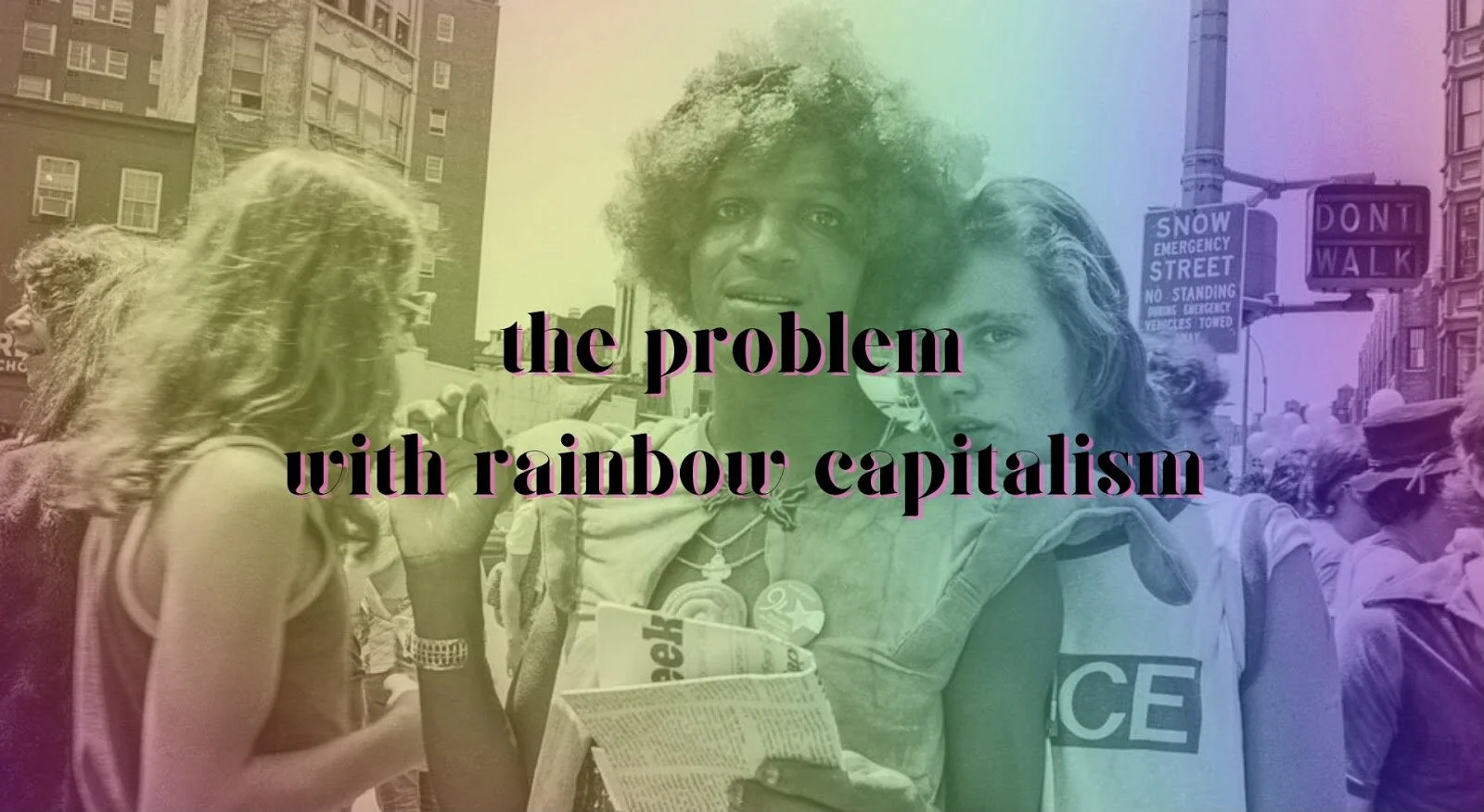The Problem with Rainbow Capitalism
Art by Kole Kistler
Since the late 1990s, June has been internationally recognized as Pride month: a month dedicated to all members of the LGBTQ+ community that aims to acknowledge, celebrate, and recognize the progress made towards change and advocation for LGBTQ+ issues.
The Stonewall Riots of 1969, too, demanded equality and liberation amongst LGBTQ+ folks. Many Queer activists, especially Black Queer people, used such riots as a means to call out their governments for their lack of LGBTQ+ representation and for perpetuating homophobic legislation and attitudes.
As a result of such activism sweeping across the United States (and ultimately across the world), LGBTQ+ individuals and their struggles have significantly-more been recognized as a political human rights issue; as a result, much current legislation aims to benefit the Queer community with an equitable degree of human rights. Although LGBTQ+ folks are still advocating for and demanding fair representation within government and legislature (as systemic discrimination and inequities amongst specific LGBTQ+ communities still exist), the community has overall been uplifted through increased societal acceptance, and the recognition of Pride month has promoted such inclusivity.
As Pride Month has continually been misconstrued merely as a celebration rather than a riot (which is how it originally started at Stonewall), many businesses in the United States have implemented marketing strategies to directly profit off of Queer liberation, which has now been coined with the term “rainbow capitalism.” Although rainbow capitalism is promoted as a beneficial way of shedding light on the presence and acceptance of the LGBTQ+ community, rainbow capitalism is problematic in the sense that businesses will use such capitalist reform to directly benefit their own company by using the LGBTQ+ community as a scapegoat for their marketing –– in other words, rainbow capitalism permits various companies to exploit off the systemic issues by which Queer folks are disenfranchised as they used “LGBTQ-friendly” labels to overshow their false allyship.
The bulk of U.S. businesses in the United States will show their unconditional support for the LGBTQ+ community by hanging a pride flag at the front of their store or even redesigning their logo to fit the rainbow-themed aesthetic. Although these capitalist approaches are displayed as efforts that, to an extent, enhance the demand for inclusivity and representation of the community, the underlying issues showcased by said approaches are that businesses only care to continue such efforts through the designated pride month of June –– once June has passed, without fail, pride banners are immediately revoked while company logos are switched back to normal on all social media platforms. With companies demonstrating resilient effort solely within the month of June to showcase their LGBTQ+ allyship, companies are disguising the reality that they only amplify such allyship in order to market business towards Queer individuals and “allies” through the direct exploitation of Queer realities and trauma.
To demonstrate true allyship for the LGBTQ+ community, companies should be held responsible for promoting more Queer-inclusive marketing tactics, specifically tactics that aim to directly benefit the community while simultaneously combatting against the marginzaliations that Queer communities still face in the current state of a progressively contemporary America. For example, companies can exemplify their efforts of unconditional allyship by not only hanging a pride-inclusive banister and rainbow-ifying their brand name but also by donating a potion of their profits to organizations that directly work to benefit the rights of LGBTQ+ individuals, teaching their clientele about Queer history and reflecting its significance back to how it remains relevant today, etc. In addition, while the concept of hanging a pride flag to display a storefront can promote a safe space for LGBTQ+ customers, keeping the pride flag up year-round versus for the sole month of June should be prioritized –– as such act of dismantling heteronormative stigmas within society should be normalized on the daily instead of just on the month in which a specific group of people are recognized for their marginalized struggles. If companies really cared about Queer lives, they would also donate to organizations to help LGBTQ+ people or refuse to back or endorse politicians that are anti-LGBTQ+.
As numerous U.S. business are dominated by cisgender-heterosexual employees as a result of heteronormativity, rainbow capitalism causes more harm than good for the LGBTQ+ community as it condones such companies to glamorize Queer struggles in a form of capitalist exploitation. As such struggles continue to be denounced by rainbow capitalist tactics, many LGBTQ+ individuals are invalidated for their experiences of living as a Queer individual in an inherently homophobic and transphobic society –– although the United States has progressively aimed to sanction LGBTQ-benefiting legislation, national heteronormativity backlashes on the progressive movement of LGBTQ+ advocacy. In order to resist the detriments of rainbow capitalism during Pride 2021 and beyond, here are a few tips compiled by So You Want to Talk About on Instagram as to how you can be a supportive, non-performative ally:
Shop at LGBTQ-owned small businesses
Donate to LGBTQ+ causes and nonprofits
Support the LGBTQ+ community by voting for candidates who recognize and prioritize the needs of the LGBTQ+ community in their platforms and who push for legislation
Boycott and speak out against businesses and brands that donate to conservative campaigns or anti-Queer organizations or have histories of homophobia
Uplift LGBTQ+ voices and demand for change


